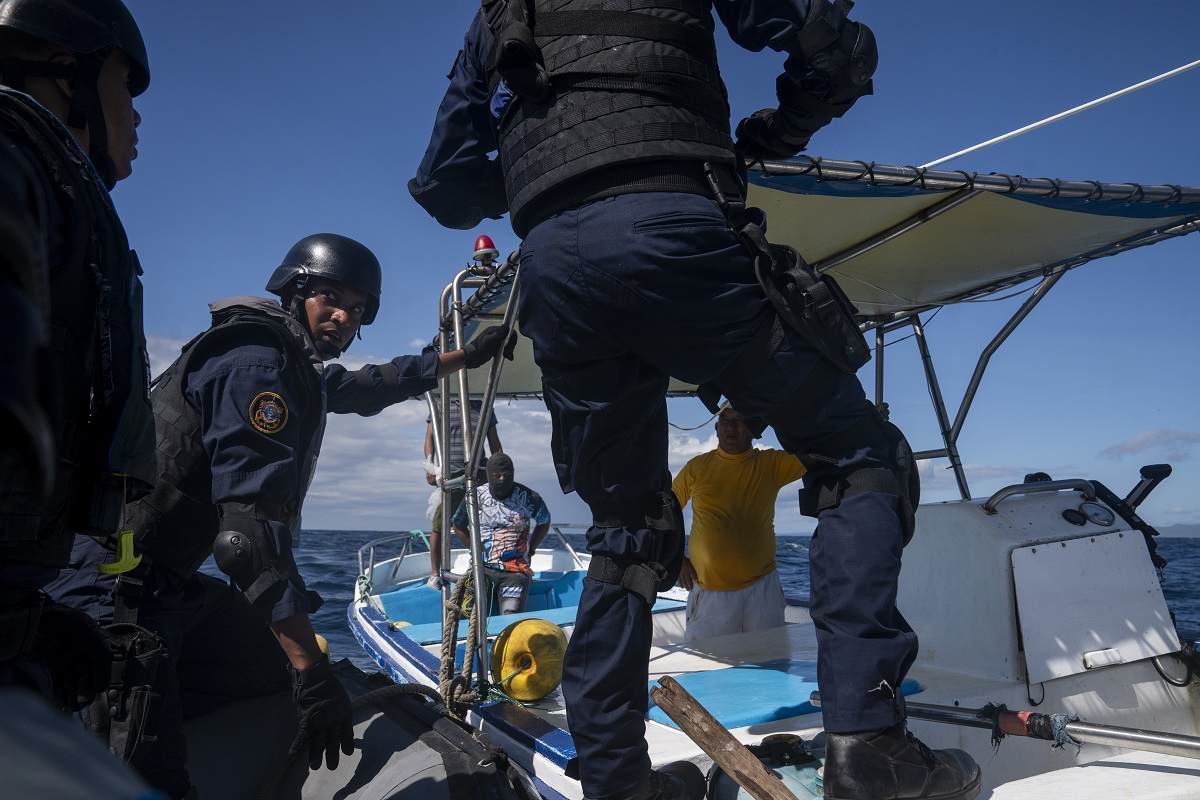
Victor John Coronado and two Coast Guard comrades board and inspect a boat they suspect of smuggling gas off San Cristóbal.
12:57 JST, January 18, 2024
ISABELA, Ecuador – Charles Darwin described it as the most desolate of the Galápagos Islands, an almost extraterrestrial outpost crawling with giant tortoises and marine iguanas found nowhere else in the world, where smoke curled out of volcanic craters and lava flowed black.
Today, more than 100,000 tourists visit the white sand beaches of Isabela. Those who come by air land at the José de Villamil airport, a lone airstrip surrounded by brush. By day, the modest facility is manned by a single employee. At night, it goes dark. There are no security cameras, no lights, no one keeping watch at the entrance to one of the most carefully protected reserves on earth.
It was here, just after dusk one evening in early 2021, that the 53-year-old airport employee was surprised by a noise: the whir of a small airplane touching down unannounced on the runway.
Panicked, he jumped on his motorbike and rushed to the police station. But by the time the authorities reached the scene, the Cessna Conquest II had been abandoned. Whoever had flown it had fled, leaving behind eight fuel containers, five of them full.
From the outset, authorities suspected drug traffickers.
The mystery offers a glimpse into the growing criminal threat to the Galápagos Islands, the beloved UNESCO World Heritage site that’s being pulled into the booming drug trade consuming much of Latin America.
In mainland Ecuador, 600 miles away, Mexican and Albanian drug traffickers have fueled a surge in gang violence unlike any in the country’s history.
On Tuesday, armed men terrorized the country in a series of apparently coordinated attacks: car bombings, prison riots, police kidnappings. One group took over a television station during a live broadcast and held the staff at gunpoint. President Daniel Noboa took the extraordinary step of declaring an armed internal conflict in the country: “We are in a state of war.”
Fueling this deluge of violence is the rising global demand for cocaine. International criminal organizations are working with local gangs to move the drug from South America to the United States and Europe. To make the journey, smugglers need gasoline. So they’ve made the Galápagos their covert refueling point. A secret gas station of the Pacific.
On Isabela, the lone airport employee feared the cartels had arrived. The Cessna was towed to the side of the runway and left there.
One morning two months later, the employee pulled up to the airport to begin work – and was treated to another surprise.
“I went to wash my face to see if it was true, what I saw,” he would tell authorities.
The ghost plane was gone.
The lucrative business of gas smuggling
Ecuador’s location – the country lies wedged between Colombia and Peru, the world’s two largest cocaine producers – has long made it a transit point for traffickers moving drugs north toward Central America.
But authorities began to step up military patrols. They seized a record 176 tons of cocaine in 2021, up from 92 a year earlier.
Now, to avoid authorities, many traffickers are blazing a more circuitous trail – one that loops just south and west of the Galápagos. They call this path through empty, open ocean the “desert route.” With go-fast boats or submersibles, traffickers can travel up to 14 days without docking, Ecuadorian Navy officials say, scratching their skin as needed to stay awake.
In 2023, the navy seized nearly 25 tons of cocaine around the Galápagos – nine tons in November alone – a 150 percent surge from 2022. In 2019, the navy captured only 1 ton.
For years, artisanal fishermen here have received government fuel subsidies to safeguard their precarious livelihoods. Many are now taking advantage of government-subsidized fuel to engage in the lucrative business of gas smuggling. Instead of using their discounted, legally purchased gas to fish their daily catch, navy officials say, scores are saving their supply for traffickers.
“I’ve been offered $6,000 to $7,000 for a trip,” one fisherman said. The man, in his early 40s, spoke on the condition of anonymity to discuss what he says was his experience gas smuggling years ago. Using a satellite phone and following GPS coordinates, he said, he met four masked men on a go-fast boat. Two were driving, he said; two were keeping armed watch over the cocaine.
“Lots of people have become millionaires off of this,” the man said. Navy officials say gas smugglers can earn up to $30,000 per job.
Cocaine seizures around the Galápagos have picked up in recent months. But it’s no longer only gasoline and drugs being smuggled through the islands: In late November, the navy found 112 rifles and 48 pistols on a go-fast boat about 150 miles south of San Cristóbal island. Investigators suspect the weapons were on their way to arm Ecuadorian gangs fighting for control of drug routes.
Pablo Ramírez, who until November led the national police force’s anti-narcotics efforts, said the Pacific smuggling route is the most challenging for authorities to control – and the waters around the Galápagos Islands are particularly vulnerable. Ramírez, who previously led the country’s prison system, was one of about two dozen top security officials and judges arrested in December for alleged criminal activity to benefit an imprisoned drug trafficker. He denies the allegations; he has not yet been formally charged.
Ecuador is responsible for monitoring more than 490,000 square miles of ocean – five times the country’s land area. The more than 24,000 boats registered for artisanal fishing embark from more than 120 ports and many more beaches that are mostly unwatched by authorities. The U.S. presence on this coastline is minimal; in 2009, leftist then-president Rafael Correa ousted U.S. forces from a military base in the port city of Manta.
Capt. Patricio Rivas, the commander of the navy in the Galápagos, said the islands have become an important source of gasoline for smugglers. He said authorities are working to track and restrict the use of fuel by artisanal fisherman.
Interviews with dozens of local leaders, intelligence officials, residents, activists and fishermen reveal an archipelago increasingly captured by drug trafficking. They describe a place where everyone knows everyone, where fishermen get rich seemingly overnight, and where a dollarized and cash-based local economy creates ideal conditions for money laundering.
Airports and docks, particularly on Isabela, have little to no security. There are no security cameras, no navy officials monitoring who is leaving or arriving at night. Port employees on mainland Ecuador say containers that are headed for the islands are rarely checked for contraband.
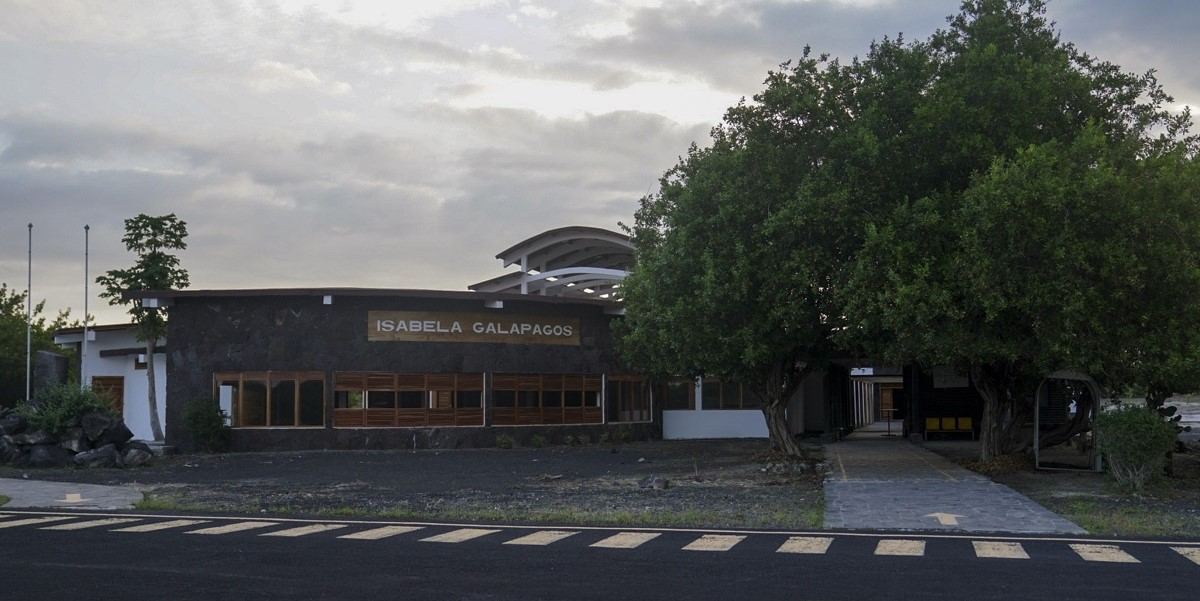
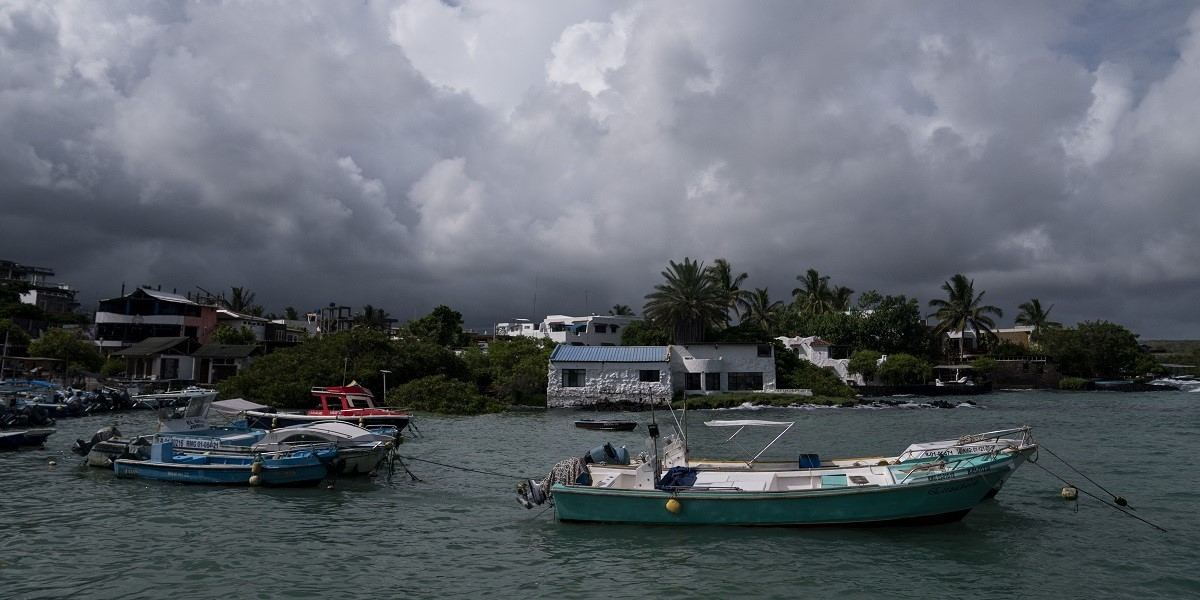
Top: The José de Villamil airport on Isabela.
Bottom: Artisanal fishing boats float in Puerto Ayora, a popular tourist destination on Santa Cruz Islan
One of the few shipping lines that carried food and supplies to the Galápagos asked authorities in March 2022 to provide a permanent police presence in the freight reception yard. The government did not fulfill the request. The business ceased operations in December.
A team of intelligence officials that traveled to the Galápagos in October 2022 to investigate allegations of corruption in the navy reported evidence that sailors were accepting bribes to allow unauthorized boats to come and go from the ports.
Islanders have for years found packages of cocaine that washed onto the beaches. But on Isabela, an island of around 3,000 inhabitants, many are afraid to report their discoveries. Some say they’ve heard unauthorized planes flying overhead. The navy intelligence service is investigating rumors of clandestine runways hidden in uninhabited corners of the island.
“Here on the islands, everyone is family,” Rivas said. “There are lots of things people keep covered up. They might know who is involved, but they won’t say anything.”
Hilda Moscoso Espinoza was born and raised on Isabela. During the 1940s and ’50s, the island was home to a penal colony. Her father was one of the last wardens.
She remembers the time before tourists, when only about 100 people lived in the town. They ate meals communally.
Now, the 58-year-old says, she sees how the flow of drugs has affected the community. A family member has struggled for years with addiction to cocaine and other drugs.
Moscoso has pleaded with local officials to establish a rehabilitation or psychiatric center to address rising drug use on the island.
“Little by little, the drugs are taking over the island,” she said. “And there is no help.”
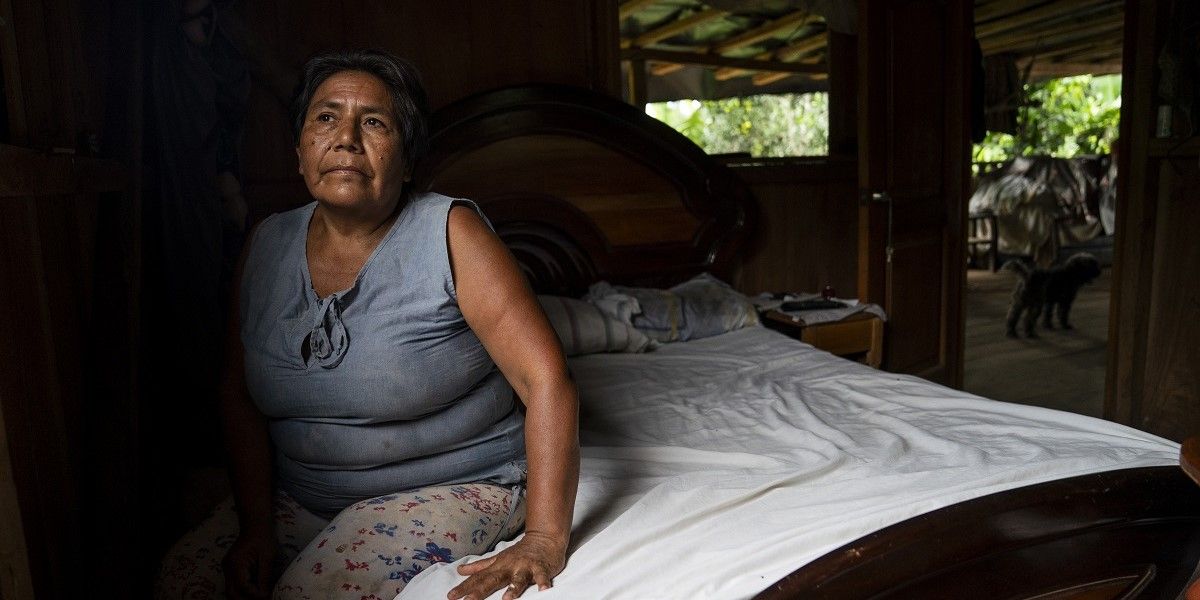
Hilda Moscoso Espinoza, whose son has struggled for years with cocaine addiction, sits on her bed at her farm on Isabela.
‘Here, it’s an open secret’
The airport administrator was terrified to go back to work.
He had asked police to watch the plane overnight, he said, or to at least install a security camera and point it at the runway. But Isabela’s 20-member police department told him they didn’t have the capacity, he said, and the case was now in the hands of prosecutors based on a different island.
The administrator, now 56, feared for his safety. He spoke to The Washington Post on the condition of anonymity.
His fears were warranted. Military intelligence officials would conclude the plane had come from Mexico. A year earlier, they said, it had traveled from Ecuador to Mexico with a different registration number, a flight now under investigation for alleged drug trafficking.
The administrator wasn’t the only person to sound the alarm.
Shortly after the plane arrived in January 2021, the head of Isabela’s police force told prosecutors he had reason to believe people on the island wanted to steal the plane, according to a memo cited in court filings. Maj. William Albán Durán requested more officers to monitor it. He also asked them to move the gas cans that had been left next to the airplane, because they made it too easy to take it.
But authorities never moved the cans, and police rarely checked on the plane, the airport administrator said.
Then, in March 2021, two months after the Cessna arrived, the police force gathered at a waterside restaurant in Puerto Villamil to celebrate Albán’s birthday. Photos in court documents show around 15 men at the Cuna del Sol raising glasses of wine. A resident nearby told The Post of seeing the officers drinking into the night.
At some point that day, authorities believe, the plane disappeared.
Months later, prosecutors charged Albán and five other police officers with “illicit association” for their alleged connection to the disappearance of the plane and an alleged attempt to cover it up. Judge Ramón Abad Gallardo accused them of removing evidence and reports on the case and of failing to remove the gas tanks from the airport. “If the fuel had not been in the plane or nearby, they would not have taken the plane out,” Gallardo said.
The officers are awaiting trial. Albán did not respond to a request for comment by The Post.
The investigation into the plane’s mysterious arrival and equally perplexing departure remains open.
Intelligence investigators reported in October 2022 that the lack of security at Isabela airport made it an ideal hub for “narcoplanes.”
In an intelligence report obtained by The Washington Post, investigators said they suspect a local airline company and a powerful businessman in the Galápagos have links to drug and wildlife trafficking.
Months after the plane’s disappearance, the airport administrator said, a man stopped by with an offer.
The man, whom the administrator recognized as an island resident, offered $100,000 in exchange for access to the runway. He didn’t say how it would be used, the administrator said, but he implied he had cut other such deals.
The administrator had suspicions about a former colleague at the airport. When the administrator refused the man’s offer, he said, the man replied: Your colleague, he was willing to take these kinds of risks.
Rivas confirmed that a former aviation authority employee was under investigation on suspicion of involvement in a “drug trafficking network.”
The former employee did not respond to texts or calls for comment.
The next day, the administrator said, another man came by the airport. This time, he said, it was a stranger, a man who had what sounded to him to be a Colombian accent. The man stepped up the offer: $250,000. More than he could earn in 10 years working at the airport.
I don’t want it, I don’t want it, the administrator said he responded.
So how much do you want? the man asked.
My life doesn’t have a price, the administrator responded.
He reported the offers to an intelligence officer, he said.
The administrator had seen neighbors suddenly find the money to open a new hotel, buy a new boat, build a new house. The men and their offers confirmed for him what he had long suspected: Isabela was awash in drug money, he said, and the authorities weren’t doing anything about it.
“Everyone already knows,” he said. “Here, it’s an open secret.”
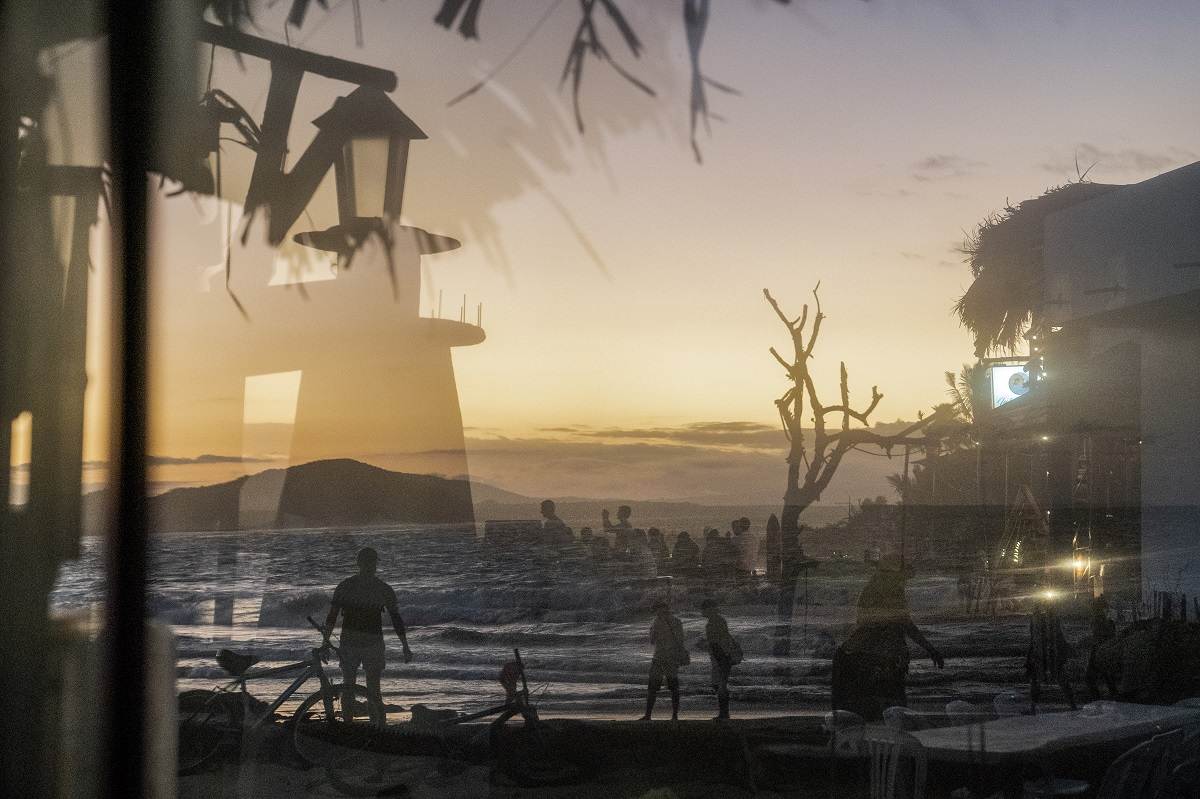
People enjoy Puerto Villamil on Isabela Island.
Top Articles in News Services
-

Survey Shows False Election Info Perceived as True
-

Hong Kong Ex-Publisher Jimmy Lai’s Sentence Raises International Outcry as China Defends It
-

Japan’s Nikkei Stock Average Touches 58,000 as Yen, Jgbs Rally on Election Fallout (UPDATE 1)
-

Japan’s Nikkei Stock Average Falls as US-Iran Tensions Unsettle Investors (UPDATE 1)
-

Trump Names Former Federal Reserve Governor Warsh as the Next Fed Chair, Replacing Powell
JN ACCESS RANKING
-

Producer Behind Pop Group XG Arrested for Cocaine Possession
-

Japan PM Takaichi’s Cabinet Resigns en Masse
-

Man Infected with Measles Reportedly Dined at Restaurant in Tokyo Station
-

Israeli Ambassador to Japan Speaks about Japan’s Role in the Reconstruction of Gaza
-

Videos Plagiarized, Reposted with False Subtitles Claiming ‘Ryukyu Belongs to China’; Anti-China False Information Also Posted in Japan






















